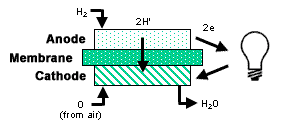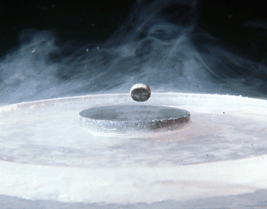
IEEE Madison Section - 2001 Meeting Archive
Institute of Electrical and Electronics Engineers

Speaker: Dean Paul S. Peercy, College of Engineering, UW-Madison
Location: Rocky Rococo's Pizza
7952 Tree Lane (Madison Beltline Hwy. at Mineral Pt. Rd.), Ph 829-1444
Menu: Pizza buffet, salad and soft drinks
Lunch Price: $8.00
RSVP by January 8th to Roy Thompson via email or call 608/664-4415
Non-member guests are always welcome!
The most recent update of the Semiconductor Industry Association International Technology Roadmap for Semiconductors outlines the technology advances needed for the semiconductor industry to continue its historical rate of productivity improvement of 25-30% per year. Leading-edge companies now manufacture devices with feature sizes smaller than 150nm. Major technical challenges were encountered in achieving the current feature sizes, and the number and difficulty of technical challenges will increase with decreasing feature size. By the end of the 15-year period addressed in the Roadmap, CMOS (Complementary Metal-Oxide-Semiconductor) field effect transistors with 20nm gate length and integrated circuit interconnects with ~35nm width are projected. This talk will present some of the major technical challenges that will be encountered as the industry attempts to continue the scaling required to follow Moore's Law. Technology breakthroughs, in terms of materials and processes, will be required as device sizes decrease below 100nm because existing materials and technologies are approaching their physical limits. New materials will be required for the gate stack since continued scaling with silicon dioxide would require oxide thickness of 0.5-0.6nm, equivalent to ~2 monolayers of oxide. Circuit speed will increasingly be limited by interconnect delays, requiring new materials for the inter-level dielectrics and new approaches to circuit design and layout. New patterning approaches will be required to obtain the feature sizes for 50nm and below. In addition, major advances in metrology will be required not only to develop these new materials and processes but also for low-cost, high volume, manufacturing.
Paul Peercy began his leadership of the College of Engineering Sept. 1. He succeeded John G. Bollinger, who stepped down this year after serving as dean for 18 years. Peercy had been president of SEMI/SEMATECH since 1995. SEMI-SEMATECH is a non-profit consortium that steers technical issues for more than 130 of the nation's top suppliers to the semiconductor industry. Prior to that position, he was director of microeletronics and photonics at Sandia National Laboratories in Albuquerque, New Mexico. He received his masters in 1963 and PhD in 1966 from the UW-Madison Department of Physics. He is a fellow of the Institute for Electrical and Electronics Engineers, the American Association for the Advancement of Science and the American Physical Society. His research spans several areas of solid state and materials physics and engineering. In his new position, he guides a college with more than 3,000 undergraduates, 1,000 graduate students and an annual operating budget of approximately $100 million.
Speaker: Donald D. Peterson, Exec. Director Energy Products and Services, Madison Gas and Electric Company
Location: Rocky Rococo's Pizza
7952 Tree Lane (Madison Beltline Hwy. at Mineral Pt. Rd.), Ph 829-1444
Menu: Pizza buffet, salad and soft drinks
Lunch Price: $8.00
RSVP by February 12th to Roy Thompson via email or call 608/664-4415
Non-member guests are always welcome!
The presentation will focus on the following topics:
Don has held various management positions at MGE including Supervisor - Generation and Transmission Planning, Manager - Residential Marketing Services, and Executive Director - Energy Products and Services. His duties have included power plant and transmission line planning and design and working with utility customers regarding their use of electricity and natural gas. He received a Bachelor of Science degree in Electrical Engineering from the University of Iowa in Iowa City and is a registered Professional Engineer in the State of Wisconsin. Don also was a past Chairman of the IEEE Power Engineering Society, Wisconsin Chapter.
Speaker: Eric C. Apfelbach, President & CEO, Alfalight, Inc.
Location: Rocky Rococo's Pizza
7952 Tree Lane (Madison Beltline Hwy. at Mineral Pt. Rd.), Ph 829-1444
Menu: Pizza buffet, salad and soft drinks
Lunch Price: $8.00
RSVP by March 12th to Roy Thompson via email or call 608/664-4415
Non-member guests are always welcome!
This presentation will focus on the opportunities, challenges, and strategies of taking technology-based concepts and ideas, and creating a business. It will use Alfalight, Inc. as an example, giving a complete view of how Alfalight, Inc. is positioned and how it got there.
Mr. Apfelbach has devoted his career to working in global high technology business, holding positions in engineering, sales, marketing, and operations. He began his career in the semiconductor industry in 1984 as a process engineer, transitioning to the semiconductor equipment business from 1989 to 1995. Eric held multiple roles of increasing responsibility, ending as the Site Manager for the global IBM account. He entered the flat panel display industry in 1995, becoming the VP of Operations at Standish LCD, supplying high reliability, high volume LCD display products. In 1997, he assisted in the sale of the company to Planar Systems, a publicly held display company in Beaverton, Oregon. Eric was promoted to VP/General Manager of the LCD Division and made a Corporate Officer shortly after the sale. In late 1999, Eric joined Alfalight, where he used his broad high tech management background to help build Alfalight, Inc. from a concept to a competitive high power laser company. He is an active member of The Executive Committee (TEC), an international association of CEOs.
Speaker:Seagate Technology LLC
RSVP by April 13th to Roy Thompson via email or call 608/664-4415
Non-member guests are always welcome!
The speaker from Seagate cancelled and we were unable to find a replacement speaker. There were also very few RSVP's so we've decided not to have a social gathering/networking meeting either. Hopefully we can make up for it with next month's meeting!
Speaker: Capital Brewery staff
Location: Capital Brewery
7734 Terrace Ave., Middleton, WI 53562, 608.836.7100
Menu: Pizza. Beer, wine and soda will be available at a cash bar.
Dinner Price: $8.00
RSVP by May 18th to Roy Thompson via email or call 608/664-4415
Non-member guests are always welcome!
The Capital Brewery was founded in 1984 and it produced its first brew in the spring of 1986. Currently, it produces sixteen different beers. Most of its beers are produced under the strict "Reinheitsgebot". These are the German beer production purity laws, which date back to the 1500s.
Much of the brewing equipment currently used in the brewery, including the two copper brewing kettles, came from the Hoxter Brewery in Germany. At the heart of the operation is an excellent refrigeration system that enables the brewery to produce extremely high quality lager beers, prompting many to refer to Capital Brewery as the finest lager brewery in America. The brewery has received many awards for its beers and was named the #1 Brewery in America at the 1998 Beverage Testing Institute's World Beer Championships in Chicago. It is a publicly held company that currently produces approximately 17,000 barrels annually and has distribution in four midwestern states.
Speaker: Niels Wolter, MSB Energy Associates & Director of Wisconsin Solar Use Network (WisconSUN)
Location: Rocky Rococo's Pizza
7952 Tree Lane (Madison Beltline Hwy. at Mineral Pt. Rd.), Ph 829-1444
Menu: Pizza buffet, salad and soft drinks
Lunch Price: $8.00
RSVP by September 17th to Roy Thompson via email or call 608/664-4415
Non-member guests are always welcome!
Niels Wolter will quickly introduce us to photovoltaic (PV) systems, and discuss their various markets. This will include plenty of photographs of PV systems for urban building integrated systems, rural grid connected systems, rural off grid systems and utility scale systems (many of them located in the Madison area). He will also summarize the costs and benefits of PV in each market. Then he will review the status of Wisconsin's PV market and what is being done to support the market (i.e., net metering, utility interconnection agreements, installer certification, and incentives). Lastly Niels will attempt to "crystal ball" the future role of PV in Wisconsin.
Niels Wolter bio:
Speaker: Herb Hannam, Program Manager, Enable Fuel Cell Corporation
Location: Rocky Rococo's Pizza
7952 Tree Lane (Madison Beltline Hwy. at Mineral Pt. Rd.), Ph 829-1444
Menu: Pizza buffet, salad and soft drinks
Lunch Price: $8.00
 RSVP by October 8th to Roy Thompson via email or call 608/664-4415
RSVP by October 8th to Roy Thompson via email or call 608/664-4415
Non-member guests are always welcome!
Herb Hannam is a Program Manager at Enable Fuel Cell Corporation, a subsidiary of DCH Technology engaged in the production of proton exchange membrane fuel cells. His particular focus is to oversee the design, fabrication, startup, test, and installation of active fuel cell systems and assist with the development of proposals for new fuel cell systems for customers. Herb also coordinates the activities of the various disciplines involved with fuel cell systems development and investigates applicable standards as they apply to fuel cells. Prior to joining Enable, Herb spent 13 years managing engineering functions as well as managing major engineering projects. He also managed the design and applications of machine controls for metal working machinery, OEM and retrofit applications. Herb holds a Bachelor of Science degree in Electrical Engineering from the University of Wisconsin - Madison.
Speaker: Cliff Olson, UW-Madison Synchrotron Research Center
Location: Rocky Rococo's Pizza
7952 Tree Lane (Madison Beltline Hwy. at Mineral Pt. Rd.), Ph 829-1444
Menu: Pizza buffet, salad and soft drinks
Lunch Price: $10.00
 Note that we have had to increase our lunch fee due to rising facility costs.
Note that we have had to increase our lunch fee due to rising facility costs.RSVP by November 5th to Roy Thompson via email or call 608/664-4415
Non-member guests are always welcome!
Fifteen years ago, the first questions about the cuprate superconductors were whether they were conventional superconductors with a very high transition temperature, or a different class of materials with a different mechanism causing superconductivity. Groups such as ours at the storage ring have pursued that question ever since. Very early, it was clear that the mechanism was different. A tremendous amount of effort around the world has made a great deal of progress, but the detailed mechanism is still not known. In the meantime, applications move forward. In the last year, it has been discovered that Magnesium Diboride is a conventional superconductor with a very high transition temperature. Since this is a simple material, that is inexpensive to produce, it lends itself to interesting speculation about applications.
Cliff Olson is a Senior Physicist with the Ames Laboratory, which is operated by Iowa State University for the US Dept. of Energy. He works at the UW-Madison Synchrotron Radiation Center in Stoughton.
Speaker: Dr. Janna Rose, Rayovac
Location: Rocky Rococo's Pizza
7952 Tree Lane (Madison Beltline Hwy. at Mineral Pt. Rd.), Ph 829-1444
Menu: Pizza buffet, salad and soft drinks
Lunch Price: $10.00
RSVP by December 17th to Roy Thompson via email or call 608/664-4415
Non-member guests are always welcome!
Just in time for battery season, Dr. Rose will discuss a one-hour battery charger.
Dr. Rose is currently Director of Lithium, Rechargable Technologies and Lights at Rayovac. Some of her other work experience at Rayovac includes Program Manager for Alkaline Product Development, Alkaline Materials Manager and Senior Chemist in the Applied Materials Research Group. Prior to Rayovac, Dr. Rose did post-doctoral work in the Physics Department at Vanderbilt University.
Dr. Rose received a BS in Chemistry from George Mason University and a PhD in Physical Chemistry from the University of Virginia. She holds seven U.S. patents on various cell systems and cell additives to improve performance and cell construction.